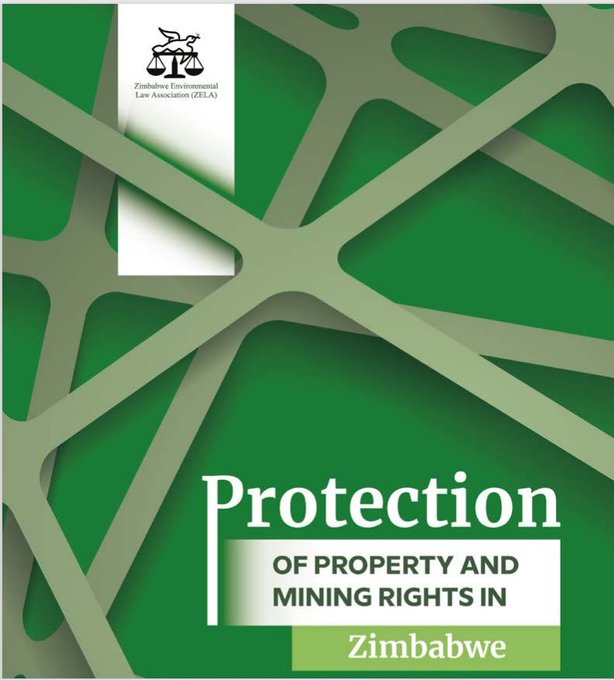|
Getting your Trinity Audio player ready...
|
The Zimbabwe Environmental Law Association (ZELA) will today, the 29th of June 2022 launch a study on the Protection of Property and Mining Rights in Zimbabwe. The study critically analyses the property rights regime and the regulatory framework in Zimbabwe which is supposed to play a catalytic role in mining investments in the country.
The study was commissioned under the Strengthening Extractive and Natural Resources Sector Transparency and Accountability through Community Action and Parliamentary Oversight in Zimbabwe (STACAP) project whose goal is to strengthen parliamentary, civil society, and community capacity to monitor and play an oversight role over executive actions for accountable and democratic social and economic development through the extractive and natural resources lens.
“We are very pleased to have been able to analyze the protection of property and mining rights in Zimbabwe. In this study, we sought to identify and assess the legal and policy framework on property rights and mining investment in Zimbabwe including providing appropriate recommendations to promote the security of tenure.
Mining-induced displacement and resettlement are causing major environmental, and social disruptions and negatively affecting the enjoyment of the cultural and economic rights of persons resettled. Yet this is an inevitable outcome of the increased drive toward mining investments. Although section 13 (4) of the Constitution enjoins the state to, “ensure local communities benefit from the resources in their areas” many communities are yet to enjoy the benefits of new mining projects developed over the past few years. The absence of a normative framework for the realisation of Section 13(4) renders it aspirational”, says ZELA Deputy Director, Shamiso Mtisi.
The State is duty-bound to take steps, to formulate development policies with a view to facilitating the full realisation of the right to development. One area that has received a fair share of criticism is the implementation of mining policies in the extractive sector. It is generally believed that the more certainty there is regarding policy and regulatory frameworks, the more investment is likely to flow into the country. Further, it is usually far easier to grant new prospecting rights and mining rights, than to tamper with existing rights as such conduct has far-reaching consequences of disturbing existing investments.
One of the biggest obstacles to investment opportunities in Zimbabwe is the constantly shifting normative framework. There is no stability in the legislative environment. A good example is the use of US$ in Zimbabwean domestic transactions and the retention policy for exporters. The promulgation of the Zimbabwe Investment and Development Act is certainly an important first step in the rebuilding process as the Act provides for the protection of investments, property rights, and equal treatment of investors. It should also be matched by stable and predictable fiscal policy and legislative provisions. In the local context, we must also then add adherence to court orders, and political stability, and ultimately surrender to the precepts of the 2013 Constitution.
“The study provides some recommendations. The greatest challenge that exists now is the absence of a stand-alone investment legislation for the mining sector. While the ZIDA Act may provide a comprehensive cover for most investment activities, it does not necessarily deal with mining concerns at the level that would achieve the purpose of mining investment law. As such the recommendations set in this study are concerned with establishing an enabling normative framework to ensure that the investments that are done in the mining sector benefit the investor, the communities, and the state,” adds ZELA’s Legal Officer Michelle Chitando.
According to ZELA’s Economic Governance Officer, Tafara Chiremba; The Constitution provides a very comprehensive road map for Zimbabwe. This includes a society that is based on equality, where everyone fully participates and can work towards their shared prosperity. It further seeks to promote the private initiative, self-reliance, and development of industrial and commercial enterprises in order to empower Zimbabwean citizens. To support these constitutional provisions, there is a need to develop legislation geared towards development-centered investment in the extractive sector, he added.
While the Constitution calls for investments that allow Zimbabwe to develop itself into a prosperous nation, legislation alone is not sufficient to guarantee an influx of investment in the manner that is desirable or that is beneficial to Zimbabwe. There is also a need for policy consistency. In addition, there must be fair and just taxation in the mining sector. Unnecessary tax breaks or exemptions may affect revenue generation, while no tax breaks or exemptions may also hinder some investments. The investment prospects in the mining sector are very lucrative. Zimbabwe offers a wide range of minerals that can be exploited. What is now needed is to create the normative framework to ensure that this is done in a sustainable manner.
The launch, which is set to bring together civil society actors, parliamentarians, captains of industry, the media, and government officials will see participants going through interactive discussions on how best the country can move a gear up in the protection of property and mining rights.






